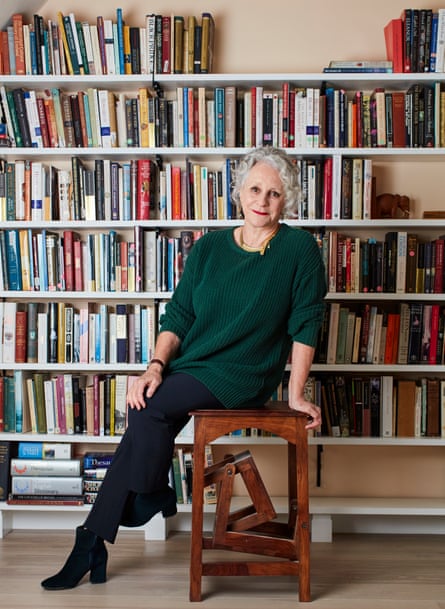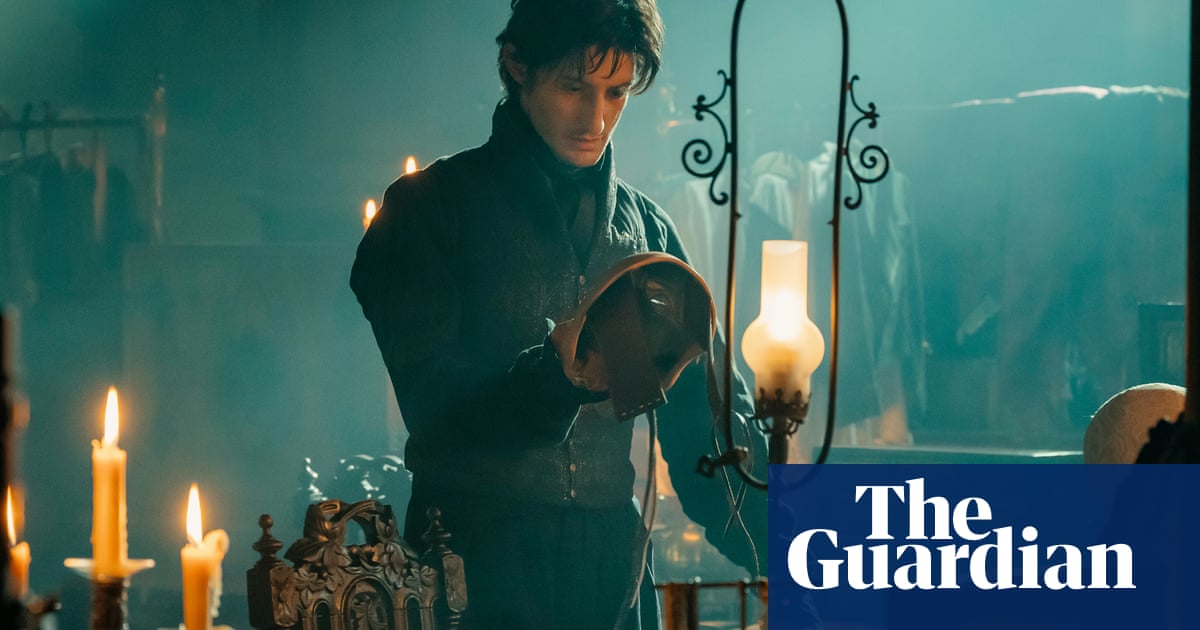The TV adaptation of the third of Hilary Mantel’s Wolf Hall novels – The Mirror and the Light – arrived on Sunday on BBC One to rave reviews. “Six hours of magic” was the Guardian’s verdict. The series had been eagerly awaited, but nothing like as eagerly as the book itself. Mantel’s legions of fans waited eight years from the publication of Bring Up the Bodies for the finale to arrive in 2020.
There was a rumour at the time that Mantel had had writer’s block – specifically, that she had been unable to bring herself to tackle (500-year-old spoiler alert!) Thomas Cromwell’s death scene. She denied this, but an atmosphere of truth clung to it. By the time she had finished with this unlikely hero – “a modern, rational, state-planning bureaucrat in the midst of all these over-ambitious nobles” is how the Oxford history professor Steven Gunn puts it, which is cool, but hardly Indiana Jones – Mantel had brought Cromwell so vividly to life that it made sense that she couldn’t bear to kill him.
Wolf Hall, the first part of the trilogy, was published in 2009. It fell on fertile ground, if by “fertile” you mean “obsessed with the Tudors”. The BBC was midway through broadcasting the glitzy drama The Tudors, with one of the producers stoutly defending the radical glow-up of Jonathan Rhys Meyers – lean and elegant as Henry VIII, who was neither of those things – by saying: “We still want him to be appealing.” Why, though, when he wasn’t? We will come to that shortly.

The BBC followed that up with Tudor Monastery Farm in 2013, a classic wholemealification of an opulent historical pleasure, such as you would expect from a public service broadcaster: “Let’s talk about ordinary people trying to herd sheep and fish for eel,” as Gunn recalls.
Then came Six, the 2017 musical in which Henry’s wives vie for recognition as the most suffering spouse. It’s a witty, joyfully anachronistic piece. Here is Anne Boleyn on the Reformation: “The rules were so outdated / Us two wanted to get X-rated / Soon, ex-communicated! / Everybody chill, it’s totes God’s will.” And it shakes the historical cliches off each queen: Anne of Cleves is no longer ugly (instead canny, hedonistic and voracious); Catherine of Aragon is no longer a longsuffering moralist (instead stubborn as hell); and Catherine Howard is – well, OK, she is still a hussy.
Last year’s movie Firebrand was a biopic of Catherine Parr, the last woman standing. It featured more tremendously flattering casting for Henry, played by Jude Law, with a bit of gobsmacking ahistoricism at the end. You couldn’t really call it revisionism – it was more like fan fiction.
But it all started in 2001, with Philippa Gregory. “There’s definitely a wave of interest in the Tudors now and I was part of generating that wave,” she says, before rowing back a little: “I was an early surfer.” The Other Boleyn Girl was the start of 15 novels in Gregory’s Plantagenet and Tudor series, a stunning, incredibly racy narrative of the Boleyn who preceded Anne in Henry’s affections – her sister, Mary.
The story came about by chance: “I wanted to work on women pirates in the 1400s, so I was in the library looking up Tudor shipping and I came upon a ship called Mary Boleyn,” says Gregory. She scoured the work of historians, but could only patchwork together Mary’s life through footnotes and margins. The resulting book (which became a film in 2008) was enough to spark a cultural fascination with the Tudors.
But it was part of a bigger plan, Gregory says: “One of the things I brought to it, which I thought was quite fresh, was trying to look at the wives as agents of their own lives. I was at university in the 80s and that was a time when women’s studies was being taught and feminism was creeping into an academic consciousness.”

Gregory summarises the story of Tudor wives laid down by traditional descriptions of the big six: “He has an older wife, gets fed up, marries a younger woman, gets fed up with her because she’s promiscuous, marries a good woman, she dies, then he has Anne of Cleves, the ugly one, then Catherine Howard, then the final Catherine, whom he marries so she can nurse him. None of these characterisations come to historians from the historical record. They choose them.”
Every time we accept a version of the Tudors as handed down by the Victorians – or later, by the 1950s and 1960s – we accept the stories that they wanted to tell themselves about authority, society, leadership, politics, religion, gender, sex, violence, the works. Whenever there is a disconnect between the brute facts and the image projected on to culture, whether in art, cliches or education, it’s by and large because we are still swallowing whole the view of the Victorians, specifically James Anthony Froude’s History of England from the Fall of Wolsey to the Defeat of the Spanish Armada, published in 12 volumes between 1856 and 1870.
The most obvious misrepresentation is of Henry himself. “I think it’s really chilling that he’s taught, still, in primary schools as a jolly king,” says Gregory. “He is a serial killer, he is an abuser of his wives, he is a tyrant. I regard him with other tyrants: Napoleon, Hitler, Stalin.”

Some of this is simply a difference between centuries. Tudor contemporaries had no trouble naming the savagery of Henry’s reign. Gunn describes Thomas Wyatt’s poem with the refrain “circa regna tonat” (thunder rolls around the throne): “It’s very simple in its language and very direct and very emotionally powerful. We can read that and think: my goodness. He’s talking about looking out of a window in the Tower of London and watching Anne Boleyn, along with his friends, go to their deaths. Wyatt is a sort of Wilfred Owen of Henry’s court – your insides are turned over.”
Yet the Victorians had no framework for understanding Henry’s lack of empathy as a mental void or a disorder rather than, say, strength or authority. They had a peculiar interest in rebranding cruelty as determination or decisiveness, in describing “the massacre of conquered peoples” as “strong leadership”, Gregory says. It’s the kind of thing you would expect from a country at the apex of its colonial activity.
The historian John Pemble has written of Fourde that he changed the telling of everything: “Henry wasn’t a coarse and cruel tyrant, but the deliverer of his people and the founder of the modern state. Anne Boleyn wasn’t the innocent victim of a monster’s caprice, but a nymphomaniac … who was properly tried and legally executed. Thomas More, the genial philosopher, was not a saint, but a sadistic bigot.
“Mary, Queen of Scots wasn’t a tragic romantic heroine, but a lethal combination of beauty, intelligence and homicidal infatuation. Elizabeth I wasn’t an Amazonian mastermind rallying the free world against the forces of darkness … she was muddled, volatile, indecisive and impulsive, and would have floundered without [her chief adviser, Lord] Burghley.”
Here you can see not only imperial self-justification, but also complicated anti-Catholicism (Fourde had beef with the cardinal John Henry Newman, but we will have to do that another time) and a profound fear of female sexuality and women’s worldly and political power.
“Most of our views on this are really dictated by the Victorians, who offer us the maiden in the tower,” Gregory says. “But in the medieval period, we’ve got heroines who have consciousness and ideas and desires. Women were recognised as being politically and economically and sexually active.” In her latest book, Normal Women: 900 Years of Making History, Gregory illustrates “the empowerment of women being taken from them, women being pushed out of guilds, out of the professions. And the big push back comes at the turn of the 1800s.”

The next big wave of Tudor retellings was in the 1950s and 1960s. Again, certainly in terms of the blockbuster output – the Academy award-winning Man for All Seasons in 1966; Anne of the Thousand Days in 1969; The Six Wives of Henry VIII, a 1970 BBC series – the era is defined by Henry’s libido, which stands in for ungovernable male desire.
“People overplay the libido thing,” Gunn says. “Henry would have pointed out that, compared with Francis I of France, he was a model of marital probity.” Perhaps they overplay it for a reason, because the other pan on that scale is murdered women.
The BBC series reheats Victorian portraits of the six wives, if anything more intensely coddling the male ego. Catherine of Aragon is needy and dowdy; Anne Boleyn insufferably jealous; Jane Seymour scheming and unsisterly, but undone by her feminine conscience; Anne of Cleves still ugly; Catherine Howard a slut; and, finally, Catherine Parr, in a rage after Henry’s death that Thomas Seymour would dare, as a lesser man, to propose to her, although she marries him anyway. This is hilarious, as Seymour “was the sexiest man in court and she married him for love”, says Gregory.
In so many ways, this century’s Tudor revisionism – fictionalised by Gregory in so many works, including The Boleyn Inheritance, The Taming of the Queen and The Last Tudor; by Mantel, of course; and in popular historical works by Antonia Fraser and Tracy Borman – has been about breaking history out of the straitjacket constructed for it by the neuroses of the past.
“Catherine Parr is an autodidact, she teaches herself Greek, she translates the psalms. And the Victorians see her primarily as Henry’s nurse,” Gregory says. Henry, meanwhile, “thinks he’s quite dutiful, but his attention span isn’t what it could be”, says Gunn. “He thinks: ‘All monarchs have to be learned and all learned people need to know Greek,’ and tries to learn it. He sticks at that for about two weeks.”
Henry had a jousting injury towards the end of his life and chronic pain (not to mention the smell of his injuries) made him less lovable than ever. Also, “we’ve got a lot more ambassadors by the time of his reign”, Gunn says. Accounts sent home by the dignitaries in Henry’s court were granular. Mantel describes Henry’s marriage to Jane Seymour thus: “No one understood what Henry saw in Jane, who was not pretty and not young. The imperial ambassador sneered that ‘no doubt she has a very fine enigme’: which is to say, secret part.”
The broad result – beyond Seymour’s fantasy vagina (for God’s sake, men of the past!) – is that we know much more about Henry’s volatile mood, his day-to-day emotional weather-making. “Maybe Henry VII got grumpy too, but we don’t have the same record,” says Gunn.
Mantel’s trilogy didn’t just create Cromwell and “the sense that he’s almost one of us, suddenly dropped into the middle of this strange world”, Gunn says. “When the second volume came out, people were saying: ‘This is astonishing – she’s made us think about Thomas Cromwell and his entire household completely differently.’ That comes from the research of Mary Robertson, at the Huntington library in San Marino [in California].”
Mantel left all her own papers to the library; she also crafted, and proselytised, a version of statecraft, masculinity, class mobility and sensibility that had its origins in Robertson’s 1975 PhD thesis – ideas that the Victorians wouldn’t have been able to conceive or accommodate. In other words, it’s not just a feminist retelling that we are living through. (Ha, “just” feminist! The very idea.)
There is one other thing that may explain the present fascination. Upheavals such as splitting from Rome were often justified in terms of constitutional absolutes. Securing an heir – what you might call the ultimate concern of sovereignty – was presented as the overwhelming concern, worth any price.
“The shadow of the Wars of the Roses still hangs over the Tudors and over their subjects, which is part of the reason they go along with what Henry is doing,” says Gunn. “The acts of proclamation often begin by saying: ‘It’s terrible not knowing who the next leader is going to be.’” Splitting from Europe; tyrannical, feckless leaders getting away with whatever they like because nothing is more important than sovereignty: does it remind you of anything? “As fish, we can’t help but swim around in the water of the current historical view,” says Gunn. “We can’t see our own biases.”

.png) 1 month ago
11
1 month ago
11













































